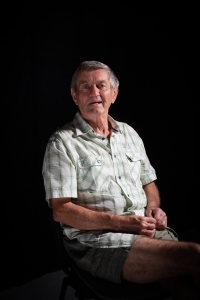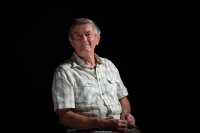“It was already difficult there... we were sewn up there, doing nothing... they just listened to the transistors, what was going on... it was terrible!”

Download image
Milan Pokoradi was born in 1948 in the village Slaná Lehota, in the region of northern Slovakia, as the youngest of three children. Mami Mária, as Milan remembers her, was a good soul who, although she only had a basic education and took care of the household, she still became a judge from the people in Lučenac. She was extremely proud of it. Father Ján worked as a mechanical locksmith and later as a repairman at the cooperative, so he was definitely a very hardworking person. During the Second World War, he actively participated in the Slovak National Uprising, as evidenced by the number of rifles thrown into the well as soon as the danger passed. Milan was born at the time of the communist coup, but his family was fundamentally unaffected. He grew up in a small village, from where he took away a lot of memories, which he wrote down on paper and named them “Bitangoviny”. He started attending elementary school in the local village, where there was a so-called single class, i.e. five grades attended one class at the same time. After graduating from the fifth grade, he completed the rest of elementary school at the elementary school in Poltár, where he commuted seven kilometers by motor train every day. He continued his high school studies at the Forestry Master’s School in Kokava nad Rimavicou, where he successfully graduated in June 1968. Milan enlisted in the military unit in Malacky on August 1, 1968, from where he was later transferred to Devínské lake, where he served as a dog handler at the border. At the time of the invasion, i.e. from August 20 to 21, Milan only participated in training in Malacca. It can be said that out of nowhere, the entire battalion was surrounded by Soviet tanks. Fortunately, there was no collision, even though it looked like anything. A few weeks later, he was transferred to the aforementioned border, where he worked as a dog handler with the dog Kurt. His mostly nocturnal services were accompanied by many unpleasant, even touching experiences. After military service, he married Mária from Slaná Lehota in 1970, and their first daughter, Gabriela, was soon born. However, Milan did not return to his birthplace and stayed with a friend in Pezinok, where he got a job in a wood factory. Later, the rest of his young family moved in, with the addition of daughters Erika and Janette. After working in the Pezinsk plant, he decided in 1978 to move to the local forests, where he worked in the dispatch warehouse as a foreman. He worked there for many years until his retirement. After the Gentle Revolution, however, he began to spend much more of his time in the garage, which he converted into a carpentry workshop. So he started working on wood again and even made extra money this way. He considers the production of moldings for frames with the likeness of the then Pope John Paul II, who visited Slovakia at the time, to be his best-rated order. He was also engaged in the production of kitchen units, tables and chairs. Currently, his home is the Senior Citizens’ Home in Ružinov, Bratislava, where he still lives today.

